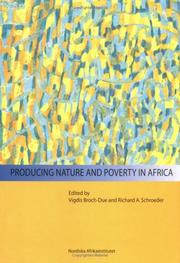| Listing 1 - 7 of 7 |
Sort by
|

ISBN: 0520216873 0520222334 9786612355042 0520924479 128235504X 058528895X 9780520924475 9780585288956 9780520216877 9780520222335 Year: 1999 Publisher: Berkeley, CA : University of California Press,
Abstract | Keywords | Export | Availability | Bookmark
 Loading...
Loading...Choose an application
- Reference Manager
- EndNote
- RefWorks (Direct export to RefWorks)
Shady Practices is a revealing analysis of the gendered political ecology brought about by conflicting local interests and changing developmental initiatives in a West African village. Between 1975 and 1985, while much of Africa suffered devastating drought conditions, Gambian women farmers succeeded in establishing hundreds of lucrative communal market gardens. In less than a decade, the women's incomes began outstripping their husbands' in many areas, until a shift in development policy away from gender equity and toward environmental concerns threatened to do away with the social and economic gains of the garden boom. Male landholders joined forestry personnel in attempts to displace the gardens and capture women's labor for the irrigation of male-controlled tree crops.This carefully documented microhistory draws on field experience spanning more than two decades and the insights of disciplines ranging from critical human geography to development studies. Schroeder combines the "success story" of the market gardens with a cautionary tale about the aggressive pursuit of natural resource management objectives, however well intentioned. He shows that questions of power and social justice at the community level need to enter the debates of policymakers and specialists in environment and development planning.
Gambia. --- Mandingo (African people)-- Agriculture. --- Patriarchy. --- Mandingo (African people) --- Women, Mandingo --- Agriculture. --- Economic conditions. --- Mandingo women --- Women, Mandingo (African people) --- Malinke (African people) --- Mandé (African people) --- Manding (African people) --- Mandingue (African people) --- Mandinka (African people) --- Mandino (African people) --- Maninka (African people) --- Maninkaalu (African people) --- Soce (African people) --- Sosse (African people) --- Ethnology --- Agroforestry --- Division of labor --- Forest ecology --- Patriarchy --- Sex role --- Gender role --- Sex (Psychology) --- Sex differences (Psychology) --- Social role --- Gender expression --- Sexism --- Androcracy --- Patriarchal families --- Fathers --- Families --- Male domination (Social structure) --- Patrilineal kinship --- Forests and forestry --- Ecology --- Labor, Division of --- Labor --- Economic specialization --- Agro-forestry --- Agriculture --- Tree crops --- Social conditions --- Political aspects --- Economic conditions --- Alkalikunda (Gambia) --- Social life and customs. --- Forest ecosystems --- Gender roles --- Gendered role --- Gendered roles --- Role, Gender --- Role, Gendered --- Role, Sex --- Roles, Gender --- Roles, Gendered --- Roles, Sex --- Sex roles --- 1970s. --- 1980s. --- academic. --- community. --- crops. --- cultural studies. --- drought. --- economics. --- economy. --- environmental. --- environmentalist. --- farmers. --- farming. --- female farmers. --- forestry. --- gambia. --- gardening. --- gender politics. --- gender roles. --- gender studies. --- geography. --- human development. --- irrigation. --- landowners. --- microhistory. --- natural disaster. --- political. --- politics. --- scholarly. --- small town. --- social justice. --- village. --- west africa. --- womens labor. --- working women. --- world history.
Book
ISBN: 1282241982 9786613813107 0253008506 9780253008503 9780253005991 025300599X 9780253006004 0253006007 9781282241985 6613813109 Year: 2012 Publisher: Bloomington Indiana University Press
Abstract | Keywords | Export | Availability | Bookmark
 Loading...
Loading...Choose an application
- Reference Manager
- EndNote
- RefWorks (Direct export to RefWorks)
Tracing the expansion of South African business into other areas of Africa in the years after apartheid, Richard A. Schroeder explores why South Africans have not always made themselves welcome guests abroad. By looking at investments in Tanzania, a frontline state in the fight for liberation, Schroeder focuses on the encounter between white South Africans and Tanzanians and the cultural, social, and economic controversies that have emerged as South African firms assume control of local assets. Africa after Apartheid affords a penetrating look at the unexpected results of the expansion of A
Whites --- South Africans --- White people --- White persons --- Ethnology --- Caucasian race --- Tanzania --- Ab'i︠a︡dnanai︠a︡ Rėspublika Tanzanii︠a︡ --- Henōmenē Dēmokratia tēs Tanzanias --- Jamhuri ya Muungano wa Tanzania --- Obedinena republika Tanzanii︠a︡ --- Obʺedinennai︠a︡ Respublika Tanzanii︠a︡ --- Ob'i︠e︡dnana Respublika Tanzanii︠a︡ --- Tʻan-sang-ni-ya --- Tanganyika and Zanzibar --- Tʻanjania --- Tansangniya --- Tansania --- Tanzanie --- Tanzanier --- Tanzanii︠a︡ --- Tanzanija --- Tānzāniyā --- Ujedinjena Republika Tanzanija --- United Republic of Tanganyika and Zanzibar --- United Republic of Tanzania --- Τανζανία --- Ενωμένη Δημοκρατία της Τανζανίας --- Аб'яднаная Рэспубліка Танзанія --- Танзания --- Танзанија --- Танзанія --- Уједињена Република Танзанија --- Объединённая Республика Танзания --- Об'єднана Республіка Танзанія --- Обединена република Танзания --- تنزانيا --- タンザニア --- 坦桑尼亚 --- 탄자니아 --- Tanganyika --- Zanzibar --- Social conditions. --- Race relations.

ISBN: 9171064524 9789171064523 Year: 2000 Publisher: Uppsala: Nordiska Afrikainstitutet,
Abstract | Keywords | Export | Availability | Bookmark
 Loading...
Loading...Choose an application
- Reference Manager
- EndNote
- RefWorks (Direct export to RefWorks)
Sociology of environment --- Economic geography --- Sub-Saharan Africa --- Environmental economics --- Environmental impact analysis --- Analysis of environmental impact --- Environmental assessment --- Environmental impact assessment --- Environmental impact evaluation --- Impact analysis, Environmental --- Environmental auditing --- Environmental monitoring --- Environmental protection --- Economics --- Environmental quality --- Environmental aspects --- Economic aspects --- Africa --- Economic conditions --- Environmental economics - Africa. --- Environmental impact analysis - Africa.

ISBN: 9171064524 Year: 2000 Publisher: Uppsala Nordiska Afrikainstitutet
Abstract | Keywords | Export | Availability | Bookmark
 Loading...
Loading...Choose an application
- Reference Manager
- EndNote
- RefWorks (Direct export to RefWorks)
Sociology of environment --- Economic geography --- Sub-Saharan Africa
Article
Abstract | Keywords | Export | Availability | Bookmark
 Loading...
Loading...Choose an application
- Reference Manager
- EndNote
- RefWorks (Direct export to RefWorks)
Frontières --- ECOLOGIE POLITIQUE --- TIERS-MONDE --- DEVELOPPEMENT INEGAL
Book

ISBN: 9780231506694 Year: 2000 Publisher: New York, NY
Abstract | Keywords | Export | Availability | Bookmark
 Loading...
Loading...Choose an application
- Reference Manager
- EndNote
- RefWorks (Direct export to RefWorks)


ISBN: 9780231506694 9780231108102 Year: 2000 Publisher: New York, N.Y. Columbia University Press
Abstract | Keywords | Export | Availability | Bookmark
 Loading...
Loading...Choose an application
- Reference Manager
- EndNote
- RefWorks (Direct export to RefWorks)
| Listing 1 - 7 of 7 |
Sort by
|

 Search
Search Feedback
Feedback About UniCat
About UniCat  Help
Help News
News